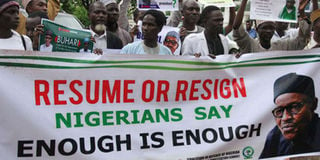Nigeria leader Buhari to fly home after treatment

Protesters in Abuja on August 7, 2017 demand that ailing President Muhammadu Buhari resume work or resign. Buhari was elected on a promise to rid Africa's biggest economy and most populous of endemic corruption. PHOTO | PHILIP OJISUA | AFP
What you need to know:
- Former president Umaru Musa Yar'Adua died in office in 2010 after months of treatment abroad.
- Dapo Thomas, a political teacher at University of Lagos, said Buhari's return would boost authority in the central government.
ABUJA
Nigerian President Muhammadu Buhari will return home on Saturday after spending more than 100 days in London receiving treatment for an undisclosed ailment, his office said.
The 74-year-old left for the British capital on May 7 with his prolonged absence causing tensions back home where calls have grown for him to either return or resign.
RECOVERY
A presidency statement said Buhari, who "returns to the country later today after receiving medical attention in London", would make a national broadcast on Monday morning.
"President Buhari is expected to speak to Nigerians in a broadcast by 7am on Monday," it said, adding that the ailing leader expressed his appreciation to Nigerians for their prayer and support towards his recovery.
Buhari, a retired general who headed a military regime in the 1980s, has been dogged by speculation about his health since June last year when he first went to London for treatment of what his aides said was a persistent ear infection.
YAR'ADUA DIES
He then spent nearly two months in London in January and February and said on his return in early March that he had "never been so ill".
In July, members of the ruling party and the opposition went to see him in London and even took pictures in an attempt to douse public anxiety.
The health of Nigeria's leaders has been a sensitive issue since the death in office of president Umaru Musa Yar'Adua in 2010 after months of treatment abroad.
Buhari's main opponents in the 2015 election that brought him to power claimed he had prostate cancer. He denied the claim.
PROTESTS
There has been a series of protest rallies in Abuja since August 7 to demand that Buhari return or quit if he is incapacitated.
The rallies turned violent on Tuesday when mainly ethnic Hausa traders pelted stones on the protesters, prompting them to shelve and announced plans to relocate to Lagos.
Deji Adeyanju, one of the protest organisers, told AFP on Saturday he was excited at the news of Buhari's return.
"We are happy that the president is coming back today because we have been vindicated," he said.
"It means that our objective has been met and that we have nothing against the president," he said.
"We organised the rallies to make him come back so that he can continue to carry out the mandate on which he was elected in 2015," he said.
INSECURITY
Adeyanju said a planned protest in Lagos on Monday has now been cancelled.
"There is no more demonstration as the president has acceded to our demand.
"But we shall continue to maintain close vigilance on the government to put them on their toes so that they can implement good policies that will address the many problems of the people," he said.
He said Buhari has to tackle the rising spates of insecurity in the country such as kidnapping, farmer-herders clashes, Boko Haram insurgency and militancy in the Niger delta.
"More importantly, the president has to end mass poverty in the land and the fight against corruption has to be given a push," he added.
POLICIES
Dapo Thomas, a political teacher at University of Lagos, said Buhari's return would boost authority in the central government.
"Every policy, every decision, every project will now have a stamp of authority and legitimacy," he said, adding that the anti-graft campaign will also be stepped up.
"Buhari's selling point is his integrity. He is very passionate about eradicating corruption from Nigeria and I think his return will re-invigorate the campaign," he said.
CORRUPTION
Buhari was elected as civilian president in 2015 on a promise to rid Africa's biggest economy and most populous of endemic corruption.
Dozens of high-profile members of the previous regime have been arrested on corruption charges, sparking criticism of a political witchhunt.





